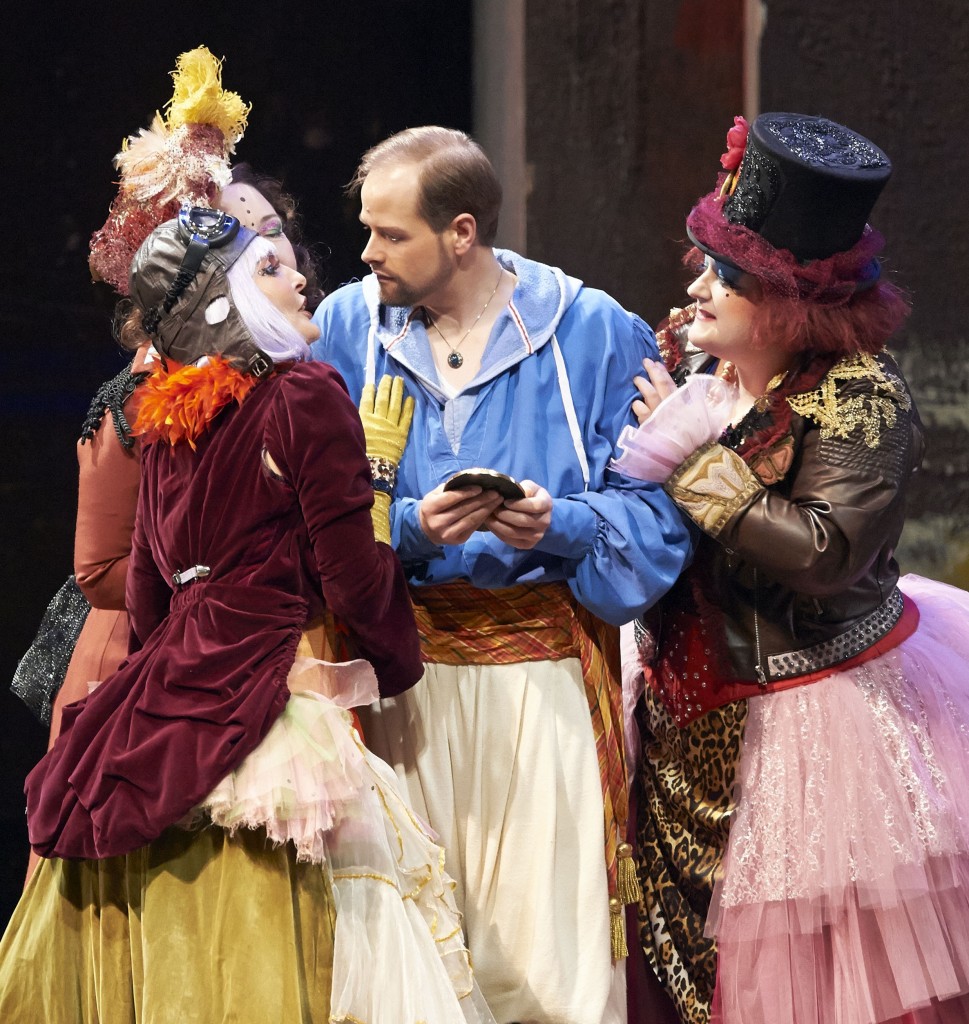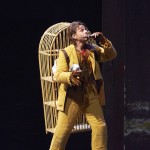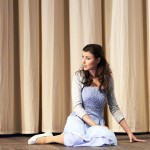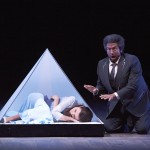 A new production of Mozart’s Die Zauberflöte at Vienna State Opera, directed by Moshe Leiser and Patrice Caurier. And what a miserable set! What set? We see the cream proszenium, but the darkened stage appears empty. Isn’t this the back of the stage, brown-painted, worn: we even see the radiators. Each side of stage are the pulley mechanisms. Isn’t this flunking the job of stage designer (Christian Fenouillat). Was he paid? But for the Overture there’s sublime orchestral playing from Adam Fischer’s Vienna State opera orchestra in the pit-a lighter textured sound: a clarity that’s revealing.
A new production of Mozart’s Die Zauberflöte at Vienna State Opera, directed by Moshe Leiser and Patrice Caurier. And what a miserable set! What set? We see the cream proszenium, but the darkened stage appears empty. Isn’t this the back of the stage, brown-painted, worn: we even see the radiators. Each side of stage are the pulley mechanisms. Isn’t this flunking the job of stage designer (Christian Fenouillat). Was he paid? But for the Overture there’s sublime orchestral playing from Adam Fischer’s Vienna State opera orchestra in the pit-a lighter textured sound: a clarity that’s revealing.
It opens with flashes of lightning, a shadow of a figure drawing a sword, the spectre of a dragon hovering. The Three Ladies, rather frumpy in beautiful multi-coloured, gypsy-like gowns, peer at Tamino (Benjamin Bruns) laid out front of stage.
 The sound of birds. Papageno (Markus Werba) wearing a rustic mustard suit, is dressed as the country yokel. Werba, curly black hair, youthful, has a rich warm baritone with a Kärnten lilt. He’s actually carrying a bird cage containing a live white dove. This Papageno is a wonderfully natural comic, sympathetic, but no idiot. The Ladies punish him for his boasting with a downfall of water; and they silence his voice.
The sound of birds. Papageno (Markus Werba) wearing a rustic mustard suit, is dressed as the country yokel. Werba, curly black hair, youthful, has a rich warm baritone with a Kärnten lilt. He’s actually carrying a bird cage containing a live white dove. This Papageno is a wonderfully natural comic, sympathetic, but no idiot. The Ladies punish him for his boasting with a downfall of water; and they silence his voice.
Tamino (Benjamin Bruns), offered the picture of Pamina, is the chivalrous knight to the rescue of the damsel in distress. Bruns, In white culottes, black boots and swashbuckling blue top, sings Das Bildnis ist bezaubernd schön. He feels it: love, like a fire in his heart. It can only be love. Sung with a touching innocence, but powerfully, Bruns’ tenor has gravitas.
Firecrackers on stage! Two luminous crescent shapes precede the Queen of the Night (Iride Martinez)) in an all-red silk gown. Zum leider– all her joy is torment without her daughter, she pitches. Ein Bösewicht , a wicked villain (Sarastro) took her daughter Tamina. But she’s so tenderly sung, how is the young man to know her scheming. If he succeeds , he shall win her daughter’s favour. Martinez, wraps her red scarf around Bruns’ neck and tugs him , like an obedient pet. The Ladies give Tamino the magic flute, which looks like an ordinary tube. Then for Papageno, a basket containing the magic bells. The Three Ladies , who sound angelic- exquisitely light- announce three boys (Knaben) will expedite the journey.
Pamina (Valentina Nafornita) in a modern light-blue silk dress comes on distraught- pursued by a rather fat Monostatus (Thomas Ebenstein) in an over-tight suit. And he’s black, with huge afro hair. Now he’s in his underwear-showing his hairy chest- gross!- threatening. (Why must the villain be black?) Nafornita sings in good German with an accent (Moldavian). Papageno writes down her description. (Is this a smart phone?)
In her aria Liebe, say it again! she sings, she can’t hear enough of the word. Pamina and Papageno are sitting together front of the stage. In their marvellous duet, they sing ,Wir wollen uns die Liebe freuen: Love sweetens everything, seasons everyday of our lives. Man and woman submit to deity. This is the Enlightenment message behind the opera, consistent with Mozart’s ethereal music.
A smoky stage precedes the three Knaben (from Vienna Boys Choir). Tell me, first, shall I be able to save Pamina? -‘Be a man, then your fate is sure’, they sing. Bruns is perfect-an ingénue-but noble, heartfelt.
A white cube, an illuminated prism- like the Louvre extension in miniature-floats towards us, symbol of Sarastro’s religious order. Sarastro’s priest tells Tamino he’s been deceived; the Queen falsely demonized Sarastro; a woman does nothing but gossip! Alone, Tamino blows the magic flute to find Pamina. All manner of strange animals appear. A polar bear and black bear embrace. There’s a rhino; an ape; and a huge dragon peers out from side of stage, which got a laugh from the audience. And there are two ostriches- nimble human legs- quite risible! All to show the magic effects of the flute in calming these savage creatures.
Worse is to come! Monostatus, the black guy (Ebenstein) is apprehended by a line of AMERICAN COPS IN LAPD UNIFORMS – frilly underwear hanging out of their pants. This is absurd; and the audience clapped!
The stage opens to a chorus in contemporary overcoats. In this fancy-dress fable, Sarastro comes on carrying a dead deer over his shoulder. Franz-Joseph Selig, in a leather-beaded greatcoat, sings -a magnificent bass- ‘A man must guide your heart…’ Monostatus is led away – cavorting, afro-hair like a James Brown; we hear his cries. Sarastro threatens love and punishment in equal measure. Tamino and Pamina, seeing each other for the first time, are separated, frustratingly, by the prism symbolising the Order. ‘Cover their heads’: they must be purified, undergo pre-marital trials.
The opening to Act 2 -Sarastro’s order-is more promising. Sarastro addresses a meeting of ‘brothers’, sitting in chairs drawn up in a semicircle, like a masonic order. They hold their hands up in assent; Pamina is praised to the gods.This is all quite convincing. Tamino submits to Sarastro’s trials . Soll ich: how bitter the tears of parting. They are kept separated, Tamino physically held back.
Thunder and lightning. Marcus Werba’s Papageno emerges, comes out from the Opera house stalls. It’s him in the mustard suit. He hugs some white-haired geezer. He sings- in the audience- laughing off the trials he’s supposed to submit to. He’s into food, wine and women. And saying excuse me ,Entschuldigen, leaps through the front row up to the stage.
Now things get absolutely crazy! The House Manager comes on stage to apologise for there being only one of the ‘Three Ladies’. The other two were stuck in the lift. For real! (I thought it was an in-house joke.) They do all come on, their singing to distract Tamino and Papageno from their trials and persuade them to escape.
 A moon crescent…Absolute silence… And now Pamina is lying in the prism of light. Monostatus sings, Everyone feels the pain of love, but a black man is hateful. (Weil ein Schwarze hasst ist.) White is beautiful. I have to kiss her! Monostatus is stealthily creeping upon Pamina, (eyeing her up for rape, but the Director is unworthily making it a race issue.)
A moon crescent…Absolute silence… And now Pamina is lying in the prism of light. Monostatus sings, Everyone feels the pain of love, but a black man is hateful. (Weil ein Schwarze hasst ist.) White is beautiful. I have to kiss her! Monostatus is stealthily creeping upon Pamina, (eyeing her up for rape, but the Director is unworthily making it a race issue.)
The Queen of the Night intervenes. Explaining why Sarastro must be killed, she then sings how her heart is aflame with anger. If Pamina cannot kill Sarastro , she will reject her forever. The Queen now has a fit and starts throwing Sarastro’s (prayer meeting) chairs. Martinez in that fabulous red gown, threatens her Rachegötter: you have only one way to save yourself and your mother.
But Pamina is saved from Monostatus’s rape attempt- demanding her love and her silence- by Sarasto’s arrival. Sarastro promises Pamina he will not take his revenge on her mother: In diesen heiligen Land In this holy land, vengeance is not our practice.
The gloom of the Second Act is literally darkened by the set itself. Pamina left alone tries to commit suicide, but is dissuaded by the Three Knaben. Nafornita is not exceptional in her moving aria, but in this staging the scene is lifted by all four floating heaven-bound safely (we hope) on high wires. Pamina accompanies Tamino on his last ordeal, and playing the magic flute, the power of music protects them. Bruns raises their duet to something special.
Of course, the Papageno, Papagena (dressed as an old hag to test him) scenes are the comic relief to the spiritual subtext. Annika Gerhards, finally revealed as a skinny blonde, wasn’t exceptional: Werba, a house favourite, got the applause.
The minimalist staging covered the conspirators in a black tarpaulin that disappeared down one of the many stage holes. In the affirmative Enlightenment chorus -a finale declaring the power of love- unsurprisingly, no stretch to the production’s imagination- a bright orange sphere rose up from the stage, now fully lit. The cast, all in modern grey suits -including Tamina and Pamina now enrolled- resembled a Mormon church meeting. P.R. 07.01.2015
Photos: Benjamin Bruns (Tamino) with Regine Hangler (First Lady) and Ulrike Helzel (Second Lady); Markus Werba (Papageno); Valentina Nafornita (Pamina); Valentina Nafornita and Thomas Ebenstein (Monostatus)
(c) Wiener Staatsoper/ Michael Pöhn
viennaoperareview.com
Vienna's English opera blog

Thank you for sharing this article with me. It helped me a lot and I love it.